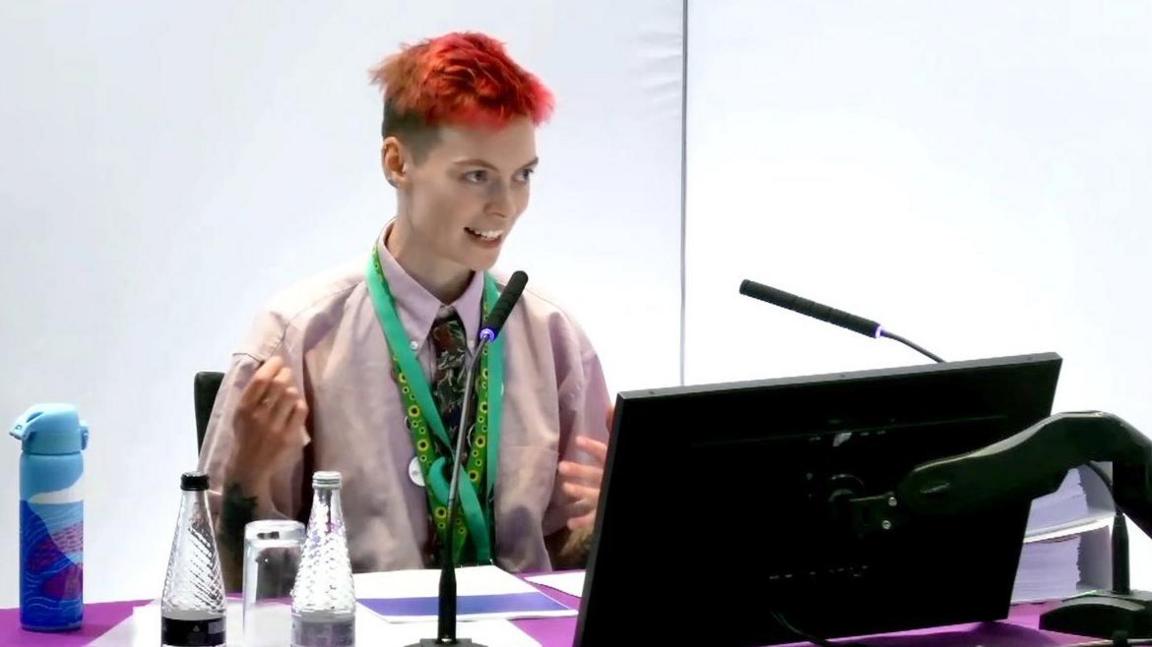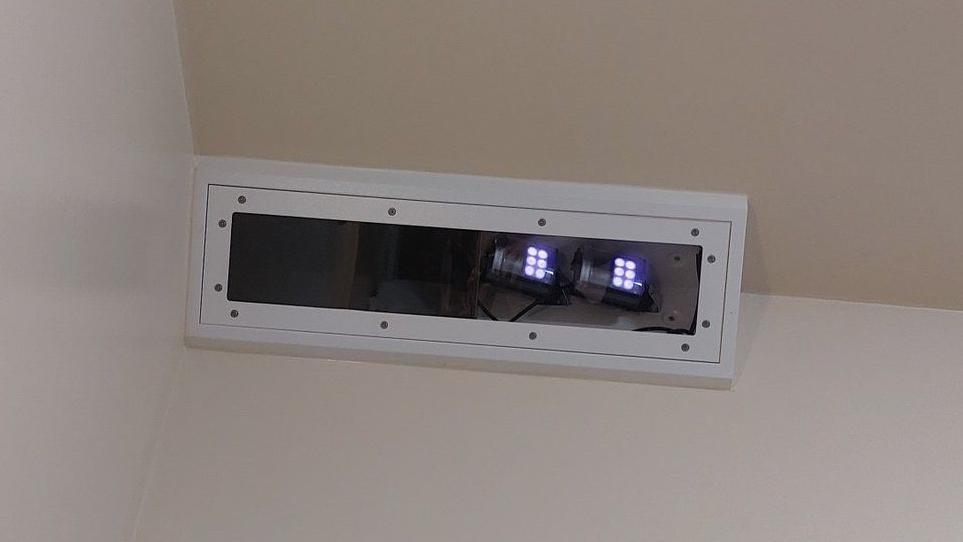Trust admits 'possible' misuse of monitoring system

The inquiry heard from Hat Porter from the campaign group Stop Oxevision
- Published
A senior healthcare boss has admitted a controversial monitoring system in mental health patients' bedrooms - which uses infrared sensors and cameras - could potentially be misused.
Essex Partnership University NHS Foundation Trust [EPUT] appeared at the Lampard Inquiry, which is looking into more than 2,000 mental health-related deaths in Essex over a 24-year period.
The public inquiry has heard that the system, Oxevision, is used by half of NHS trusts across the country.
Zephan Trent, executive director of strategy, transformation and digital at EPUT, told the inquiry that improvements had been made in staff training, and that patient consent for the use of Oxevision was now actively sought.
Oxevision can detect both pulse and breathing rates of patients with its sensors, which are positioned in the corner of their bedrooms. The system can send alerts when it detects signs of distress or abnormal activity, with staff then able to view up to 15 seconds of clear video of the patient's room on tablet devices or a screen in the nurse's office.
The company which created Oxevision told the inquiry on Monday that cameras were effectively continually recording, which could possibly "constitute a very significant invasion of privacy".

Oxevision uses infrared sensors and cameras to monitor patients while they are in their bedrooms
Mr Trent told the inquiry that it was "possible" that staff may have previously taken additional views of patients' bedrooms by continually refreshing the 15-second feed, which would be "clearly an inappropriate use of the system".
"That is not what we would expect our staff to be doing, that's not what our policies say," he said, agreeing when pressed by Nicholas Griffin KC, chief counsel to the inquiry, that there was "a real possibility" that the system was being misused.
'Alarm fatigue'
Mr Trent was asked about three inquests where the use of Oxevision had been highlighted - the deaths of Michael Nolan and Morgan Rose-Hart, who died in 2022, and 16-year-old Elise Sebastian, who died in April 2021.
Mr Griffin asked if there was a danger of "alarm fatigue" for staff, turning off or ignoring alerts from the Oxevision system.
In Elise Sebastian's case - who was found unresponsive in her bedroom at the St Aubyn Centre in Colchester - she was supposed to receive one-to-one care, but an inquest heard the Oxevision system had been muted by staff and she was left alone for 28 minutes.
Mr Trent told the inquiry there had been mechanisms in place to ensure staff adhered to policies, "but they clearly did not prevent these tragic events".
"The trust accepts that it should have done better… [and made sure] that staff were fully compliant with the policies and procedures that were there," he said.
But Mr Trent said that many new technologies were "in the best interests of patients".
"The government have been clear with their 10-year plan for health they want to see a change from analogue to digital," Mr Trent said.
But he admitted that some technologies were "more controversial than others".
Mr Trent also reiterated an apology from EPUT to bereaved families who had lost loved ones under mental health services in Essex.
'Rights stripped away'
The inquiry also heard from Hat Porter, from the campaign group Stop Oxevision.
They said Oxevision "instilled a constant sense of surveillance" and there was no way for patients to know when staff members might be looking at the video feed of their room.
It was also not possible to prevent staff using the video feed to "maliciously" view patients during private moments, they added.
Mx Porter told the inquiry that people within mental health settings were in vulnerable positions "having [had] their rights stripped away".
When asked by Rachel Troup, counsel to the inquiry, if the voices of those people "might not be as loud… as others", Mx Porter said: "The voices are loud, they are just not listened to."
Mx Porter said patient consent for the use of Oxevision had not been explicitly sought by EPUT - with "vague" language used on posters to describe the system - but Mr Trent told the inquiry that patient consent was now actively sought after a change of procedure.
The fifth set of hearings at the Lampard Inquiry will turn its focus back to bereaved families of people who have lost their lives under mental health services in Essex between 2000 and 2023.
Evidence sessions are due to run until November 2026, with Baroness Lampard's recommendations not expected until 2027 at the earliest.
Get in touch
Do you have a story suggestion for Essex?
Follow Essex news on BBC Sounds, Facebook, external, Instagram, external and X, external.
- Published14 October

- Published13 October